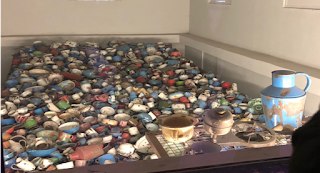Walking through the gates of Auschwitz and reading the sign “ARBEIT MACHT FREI” meaning “Work Sets You Free,” was extremely difficult to comprehend. I could not believe that I was actually here. It took me a moment to process that I was standing on the grounds where heinous crimes occurred. What really struck me as I walked through the camp, was seeing the pictures of all of the prisoners on the wall, and learning about how dehumanized they were, from losing their “civilian clothing;" shaving their heads; and getting hardly any meals or no meals at all. Hearing this was extremely rough and made me think about all the suffering the prisoners went through.
Many of the prisoners were forced out of their homes and brought many belongings, including pots and pans. Talking in class and learning that they brought pots and pans with them was something that I always tried to put aside. It was odd to think that they brought kitchen household items, but that is because I learned of what occurred at the camps. The prisoners had no idea. Seeing all of the kitchenware as I walked through the room was an eye-opening experience. As they were being deported from their homes, they probably assumed that they were being moved somewhere else, so naturally they brought belongings like their pots and pans, in their minds, they did not think that they would be going to a concentration camp where they would be killed. I cannot even fathom bringing my personal belongings with me including, household items, only to find out that I would be going to a concentration camp where my life would soon come to an end.
 |
| Photo: Many of the pots and pans the prisoners bought with them. |
What struck me the most were the photographs of the children. I always see pictures of adult prisoners, but I do not often see photos of the children. Seeing how frail, ill, and maltreated they were was extremely emotional. Many of these children had no idea what was going on, or what their fate would be, which I could only imagine would have been extremely terrifying and traumatizing. Especially, getting separated from their family and parents, and not knowing where they were going, must have also been terrifying for a child. Many of the children were dehumanized, starved and put to work, and had to wear prisoners’ uniforms. Seeing the pictures on the wall of the children was an emotional experience for me. Knowing how they were treated and what they went through made me horrified, especially seeing all of the shoes and children’s clothing. I cannot even imagine what they went through or even the thought of being taken away from my family. For the parents of the children, not knowing where their child was being taken or what fate lie ahead for them, must have been an extremely fearful experience.
There were 1.5 million Jewish children killed, between 140,000-150,000 Poles were killed, 2,300 Gypsies killed, and 13,000 Soviets killed. In reading "The Holocaust Kingdom" and how the Jews were dispersed from their land and learning about what belongings they could bring with them, then actually seeing those belongings in the camp, put so many things into perspective.
Talking in class about the number of prisoners who were killed and coming to the camp and seeing some of their pictures, put into context the severity of the suffering the prisoners went through and how humbling and emotional this is. All of the stories of the prisoners will live on as we remember them.













0 comments:
Post a Comment